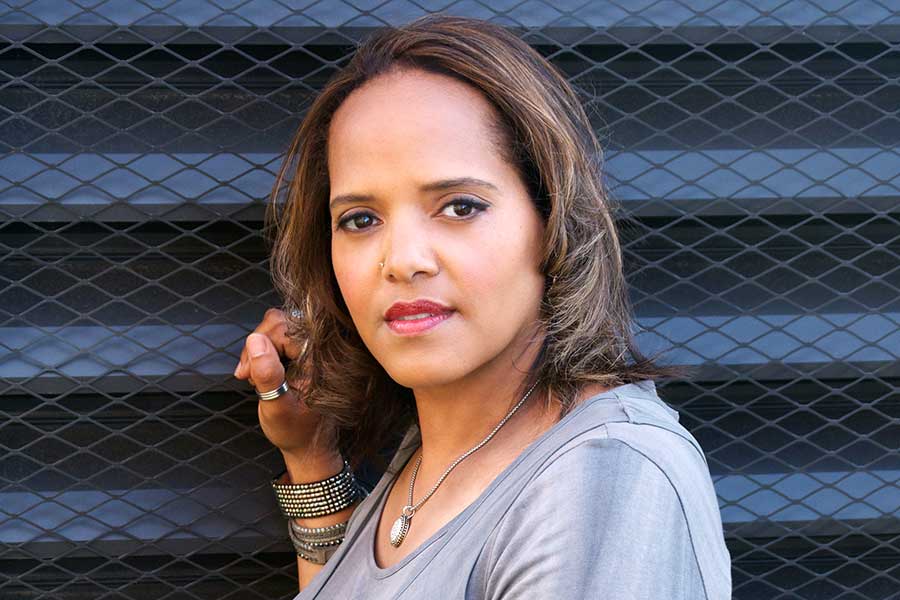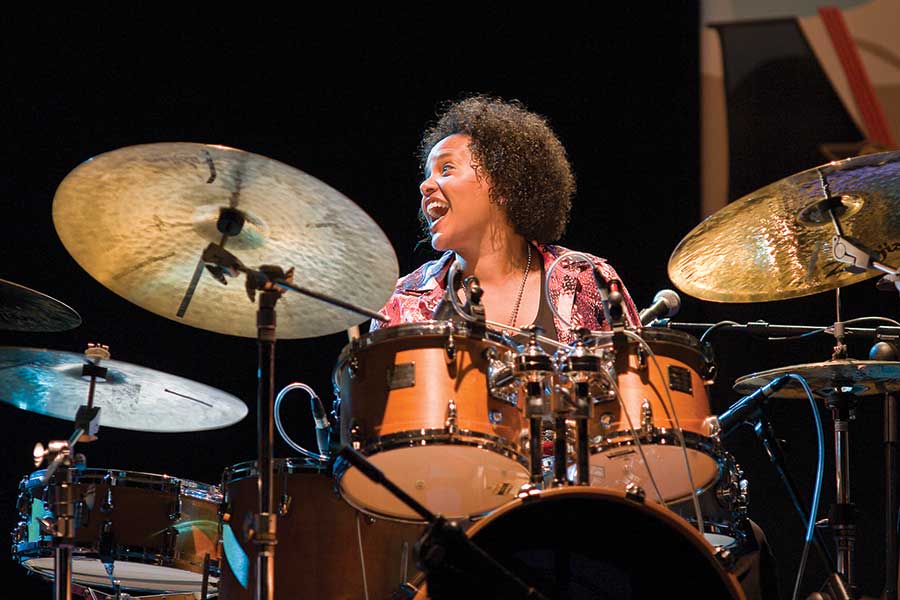
After achieving commercial success and aesthetic respect as one of jazz’s towering figures, Duke Ellington often spoke about never speaking about “jazz” again: After 1947, he refused to use that musical-genre tag because, he said, it segregated him and anyone else who made America’s classical music from pure expression.
What Ellington played then was the “sound of freedom,” something drummer-composer Terri Lynn Carrington insists upon in her own music and its genre-fication. Carrington and her small ensemble are touring to perform one of her seminal recent works, “Money Jungle (Provocative in Blue),” Nov. 14 at Blue Bell, PA’s Science Center Theater. That happens to be dramatic because “Money Jungle” was also one of Ellington’s finest — a tightly wound epic with the rhythmic interplay of equally legendary player-composers Charles Mingus on bass and Max Roach on drums.
“It is a daunting task to take on any Ellington, but I have love for Duke,” said Carrington. “He is the grandfather of all of us. If it wasn’t for him, little of what we do now would be here.”
Like Ellington, Carrington doesn’t like labels. She never came “out” (she identifies as bisexual rather than gay, as assumed by many when she played last year’s OutBeat in Philly, the United States’ first festival gathering of LGBTQ jazz-bos), yet proudly stands up for all who do. Ellington too is tithed to jazz’s gay lineage through his famous co-composer and arranger Billy Strayhorn, a gay man, who like pianist Cecil Taylor, vibraphonist Gary Burton and drummer Allison Miller stayed closeted for most of his professional life.
Also Nov. 14 in Philadelphia, at the Annenberg Center, is jazz chanteuse Diane Reeves. The composer-singer, who is straight, has created gay anthems and gay-friendly atmospheres in some of her best-loved musical moments. Like Chaka Khan’s “I’m Every Woman,” Reeves’ “Endangered Species” speaks to the braveness of being a woman of color, yet with unapologetic dignity: “I am an endangered species/But I sing no victim’s song/I am a woman I am an artist/and I know where my voice belongs.” That message has come to stand for the dignity of the gay struggle: Don’t victimize, empathize.
Reeves is also known for spicing up a live monologue that usually precedes her cover of the Temptations’ “Just My Imagination” with a story about a childhood romance whom she later found out was gay. “That was based upon a composite of many gay people I knew in class,” Reeves told JazzTimes Magazine in 2010. “I tell that story in a live-and-let-live manner, and I’ve had many gay people come up to me after the concert, introducing me to their partners.”
Carrington speaks more broadly about whom and why we love with “The Mosaic Project: LOVE and SOUL,” her newest album and the second in the series of Mosaic Project efforts that bridge the wide gaps of pop, funk, R&B and jazz with joyous melodies and big female vocals (from Ledisi, Valerie Simpson and Philly’s Jaguar Wright).
“I’ve grown as a player and as a composer so everything that I do, you do, is the sum total of your existence, everything from what you listen to — be it soul or classic rock — to who you hang with,” said Carrington.
She started her career as part of avant-garde jazz’s fusion funk-hop experiment, M-Base and its progenitors, saxophonists Greg Osby and Steve Coleman. She found mentorship in the likes of Clark Terry, Jack DeJohnette and Wayne Shorter. When Carrington speaks, she carries a stick bigger than the ones she uses to drum.
“Jazz and mentorship used to feel more like a family. I miss that. There aren’t many mentorship opportunities for young people,” she said, adding that she believes technology makes people more insular and less communal. The wide communal circle is where we learn, she said.
“I would not be where I am today without these people showing me the way, the ropes, and telling me what time it is,” Carrington laughs. “Telling me when things were great and not so great.”
Ask her what parts of that deep background — the pop and soul of Mosaic Project in particular — touch her as a drummer, performer or teacher (she is a professor at Berkley) and she is quick to respond with an old reliable favorite.
“I love drum things, tribal drum grooves, repetitive grooves, because you’re not worrying about fills,” she said about the hypnotic pulses that fill her Mosaic Project. “This particular record of mine is definitely more groove-oriented, repetitive but with a lot of twists and turns to keep it interesting. I tell all of my students that if you can’t listen to or play along with a James Brown groove without taking a fill, they are missing out on something crucial, as the instrument is tribal by nature. It’s not too much to ask to get into the origins of the instrument.”
When it comes to rhythm, one of Carrington’s prime motivators has been Philly bassist Christian McBride, who took on the Mingus role to her Roach role on the Money Jungle project. She wasn’t looking to emulate the vibe of Ellington’s Money Jungle album, but also couldn’t deny that its ghost hovered over the recording studio while she was making that record with McBride.
“Christian was the perfect extension of Mingus, the tradition and the contemporary stuff; someone to bring the authenticity of the time period as well as approach the current grooves,” she said.
Philly is ever-present in Carrington’s work, considering her use of McBride and Jaguar Wright and her love of local legends of jazz’s past (John Coltrane) to its present (Orrin Evans) with a little R&B on the side (“I won’t even get into telling you how much I love Miss Patti,” she said of Labelle). “I don’t know what’s going on with you guys, but I’m guessing it’s something in the water. I should stop and drink some.”
And Carrington again expressed how the Duke did things his way — and his way meant growth and freedom, personally, professionally and aesthetically. “Jazz for him, he said that it was just freedom of expression. That is how I feel about music and life. He gave us permission to think that.”
Carrington said she’s too busy trying to be creative to worry about her sexuality. Quick to tell me that she just turned 50, she is hotter to get things done artistically than anything else in her life at present. When she talks about her sexuality — a private thing, for sure — she doubles down on the idea of freedom of expression.
“That’s me all the way. I may date a man, I may date a woman; whoever floats my boat. I don’t claim to be any one thing. I think people want you to be in their club. That’s cool but the only real club I am in is the freedom club. Now, I am in support of the community wholeheartedly and it reflects who I am some of the times, but politically it’s part of me all the time.”
